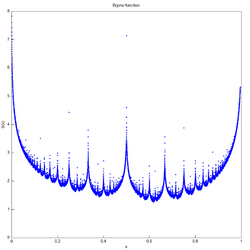Brjuno number
In mathematics, a Brjuno number (sometimes spelled Bruno or Bryuno) is a special type of irrational number named for Russian mathematician Alexander Bruno, who introduced them in (Brjuno 1971).
Formal definition
An irrational number is called a Brjuno number when the infinite sum
converges to a finite number.
Here:
- is the denominator of the nth convergent of the continued fraction expansion of .
- is a Brjuno function
Examples
Consider the golden ratio φ:
Then the nth convergent can be found via the recurrence relation:[1]
It is easy to see that for , as a result
and since it can be proven that for any irrational number, φ is a Brjuno number. Moreover, a similar method can be used to prove that any irrational number whose continued fraction expansion ends with a string of 1's is a Brjuno number.[2]
By contrast, consider the constant with defined as
Then , so we have by the ratio test that diverges. is therefore not a Brjuno number.[3]
Importance
The Brjuno numbers are important in the one-dimensional analytic small divisors problems. Bruno improved the diophantine condition in Siegel's Theorem by showing that germs of holomorphic functions with linear part are linearizable if is a Brjuno number. Jean-Christophe Yoccoz (1995) showed in 1987 that Brjuno's condition is sharp; more precisely, he proved that for quadratic polynomials, this condition is not only sufficient but also necessary for linearizability.
Properties
Intuitively, these numbers do not have many large "jumps" in the sequence of convergents, in which the denominator of the (n + 1)th convergent is exponentially larger than that of the nth convergent. Thus, in contrast to the Liouville numbers, they do not have unusually accurate diophantine approximations by rational numbers.
Brjuno function
Brjuno sum
The Brjuno sum or Brjuno function is
where:
- is the denominator of the nth convergent of the continued fraction expansion of .
Real variant

The real Brjuno function is defined for irrational numbers [4]
and satisfies
for all irrational between 0 and 1.
Yoccoz's variant
Yoccoz's variant of the Brjuno sum defined as follows:[5]
where:
- is irrational real number:
- is the fractional part of
- is the fractional part of
This sum converges if and only if the Brjuno sum does, and in fact their difference is bounded by a universal constant.
See also
- Irrationality measure
- Markov constant
References
- Brjuno, Alexander D. (1971), "Analytic form of differential equations. I, II", Trudy Moskovskogo Matematičeskogo Obščestva 25: 119–262, ISSN 0134-8663
- Lee, Eileen F. (Spring 1999), "The structure and topology of the Brjuno numbers", Proceedings of the 1999 Topology and Dynamics Conference (Salt Lake City, UT), Topology Proceedings, 24, pp. 189–201, http://topology.nipissingu.ca/tp/reprints/v24/tp24114.pdf
- Marmi, Stefano; Moussa, Pierre; Yoccoz, Jean-Christophe (2001), "Complex Brjuno functions", Journal of the American Mathematical Society 14 (4): 783–841, doi:10.1090/S0894-0347-01-00371-X, ISSN 0894-0347
- "Théorème de Siegel, nombres de Bruno et polynômes quadratiques", Petits diviseurs en dimension 1, Astérisque, 231, 1995, pp. 3–88
Notes
- ↑ Lee 1999, p. 192.
- ↑ Lee 1999, p. 193–194.
- ↑ Lee 1999, p. 193.
- ↑ Complex Brjuno functions by S. Marmi, P. Moussa, J.-C. Yoccoz
- ↑ scholarpedia: Quadratic Siegel disks
 |
